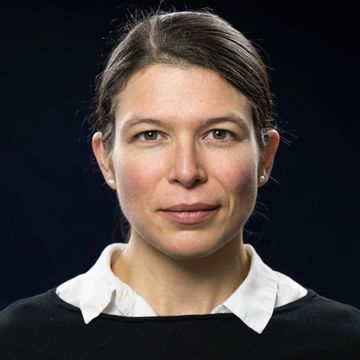The fundamental moral challenge faced by public experts

Scholars often step into the public arena to discuss their expertise, but in doing so, do they inadvertently also become a voice for the people they study?
Renowned Black writer and public intellectual James Baldwin, often regarded as a voice of Black Americans of his generation, once grappled with this moral dilemma. He mused, “That artist is strangled who [has] the necessity thrust on him of being the representative of some thirteen million people. It is a false responsibility (since writers are not congressmen) and impossible, by its nature, of fulfillment.”
In a recent faculty research fellows talk, Wendy Salkin, assistant professor of philosophy and, by courtesy, of law, quoted Baldwin to illustrate the ethical dilemma faced by scholars in the public eye. Presenting her new paper, “Writers Are Not Congressmen,” Salkin unraveled the moral complexities of this position.
Salkin began by disentangling the public conflation of two distinct roles. One is what Salkin calls a “public-facing theoretical authority,” an expert who speaks publicly about a particular social group based on their expertise concerning that group. The second is what Salkin calls an “informal political representative” for a group, a non-elected spokesperson who conveys a group’s values, interests, and preferences; interfaces with other groups; and advocates for political action on the represented group’s behalf. (Salkin’s forthcoming book, Speaking for Others, concerns the ethics of the informal political representative role.)
“Public-facing theoretical authorities are frequently treated as speaking for the group that is the subject matter of their work by various public audiences,” Salkin argues. “You can have this role of informal political representative unwillingly or unwittingly.”
While experts strive to discover and report impartial and complete information, informal political representatives may be expected by the groups they represent to omit certain information or present a specific perspective to 'stay on message.'
For public experts who find themselves in such a position, serving as an informal political representative is morally fraught since it can clash with the commitments of a public expert, according to Salkin. While experts strive to discover and report impartial and complete information, informal political representatives may be expected by the groups they represent to omit certain information or present a specific perspective to “stay on message.”
As a result, experts who speak publicly about a group of people may balk at the expectation that they speak for that group. Nevertheless, public audiences often confer the position of informal political representative onto public experts, whether they are willing to take on such a mantle or not.
“How should we understand that ambiguous social role that such [public experts] inhabit?” Salkin asks. “They have voluntarily undertaken the role of speaking or writing publicly about particular groups and their plight, but they haven't necessarily signed on for this further role of representative for the group whose plight they document. What does that demand of them?”
Public experts have several responsibilities to the groups they are taken to represent, according to Salkin. For example, public experts must consider potential harm to group members when speaking publicly, recognizing how their speech may lead to backlash or harm against group members.
Salkin further considers the difficult situation of public experts who find themselves compelled to represent a group because no one else is doing so. To illustrate this difficult position, Salkin discusses journalist Ida B. Wells’s decision to cover a lynching after Wells was reminded by her son, “‘Mother, if you don’t go nobody else will.’” Salkin argues that the responsibility to speak on behalf of underrepresented groups is a shared responsibility that does not fall uniquely on willing public experts simply because others are shirking their responsibilities.
The conflation of public experts and informal political representatives is especially likely, and the resulting moral challenges especially fraught, for public experts who belong to the group about which they speak publicly. Salkin discusses Black scholars and journalists who write about anti-Black racism, yet are discredited by their audience for purportedly lacking objectivity as members of the group in question, thus jeopardizing public perception that they are public experts.
Although public experts do not sign up to be “congressmen,” resignation from the role of informal political representative, once the role has been conferred by an audience, is often not an option. Just as Baldwin did in his essay “Many Thousands Gone,” public experts today must also grapple with this difficult moral quandary.


